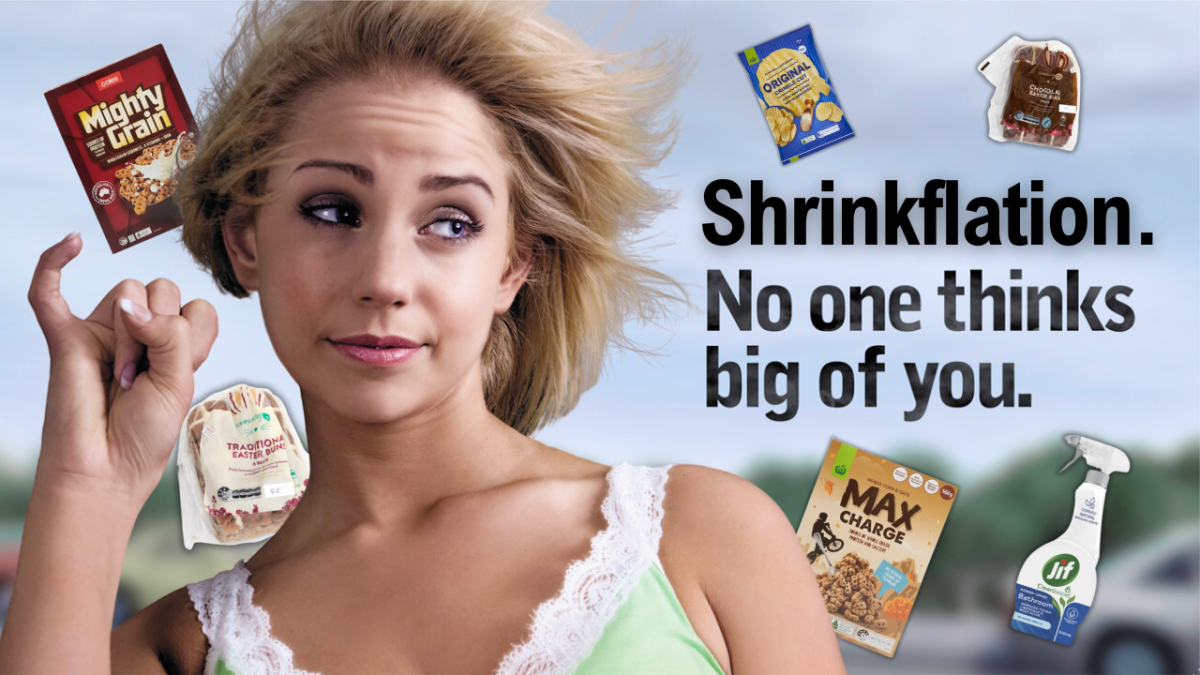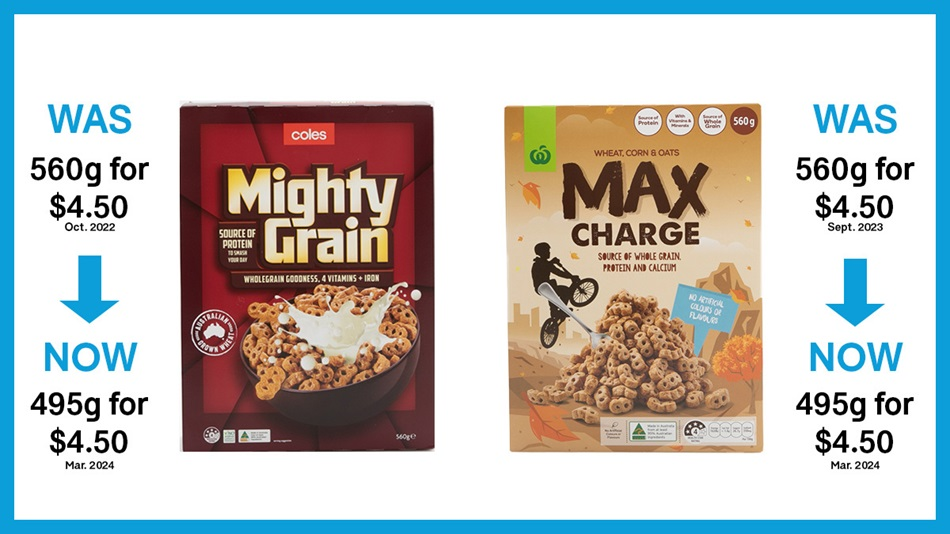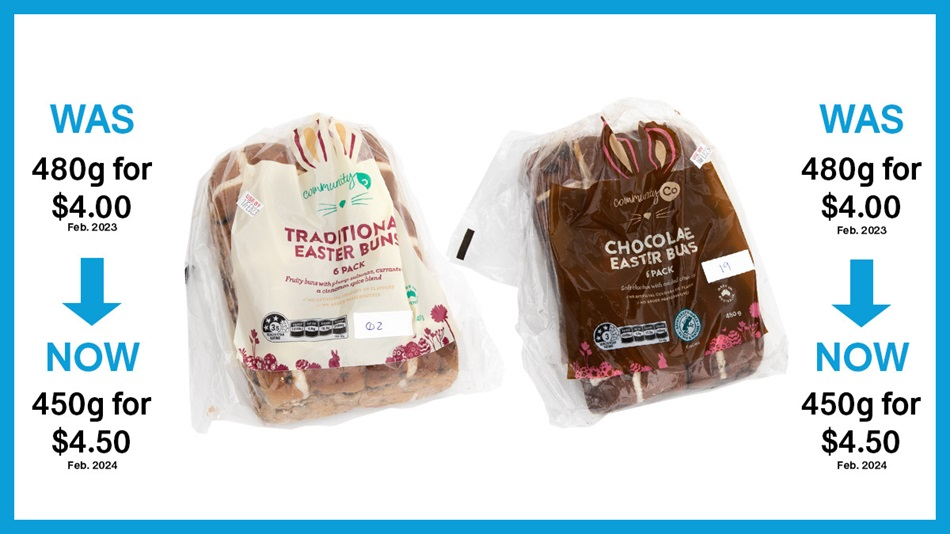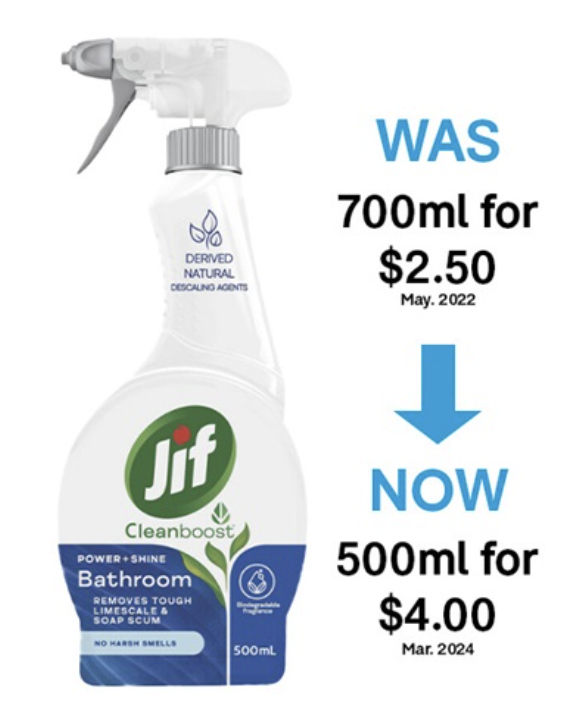
A new study by the consumer advocacy group Choice has revealed what the biggest culprits of shrinkflation have been in 2024. And by biggest, we actually mean smallest, because ya know… it ain’t called shrink-flation for nothing.
As the cost of living crisis continues to raw dog Australians just trying to live, one of the many factors contributing to the economic issues is shrinkflation. AKA that really annoying thing where products can shrink in size, but cost the same — or more.
And if you pair shrinkflation with extreme price gouging, then supermarkets would have a lot to answer for, just like Coles and Woolworths in their ACCC and Senate investigations this year..
Everyone who’s shopped at a grocery store over the last few years has been a victim of shrinkflation, often without even knowing it.
The real evil of this pricing trick is when it occurs incrementally over a long period of time so that consumers don’t even notice how suddenly their chocolate mud cake has dropped from 600g to 585g but still costs $6.
Woolworths Mud cake. Down from 600g to 585g
byu/FillinThaBlank inshrinkflation
Is the treasured Aussie school delicacy of the mud cake not even safe from shrinkflation???
The problem is, due to shrinkflation’s inconspicuous nature it can be hard to keep track of exactly which products have shrunk in size while stayed the same price.
This is where Choice come in.
Choice, a consumer advocacy group who run investigations and studies into issues faced by everyday shoppers, have been tracking the cost of regular products in Aussie supermarkets such as Coles, Woolworths, and IGA.
“We’ve heard from countless shoppers who are feeling frustrated by the prevalence of shrinkflation in supermarkets,” said Bea Sherwood, Choice’s senior campaign and policy adviser.
What it found was which products had suffered most from a bit of shrinkage in 2024, and then charged more for the smaller package.
And it’s not that we want to encourage the public shaming of people who might not be as big as they claim to be — it’s not all about size, baby!
However when you’re gaslighting consumers into paying more for less… then you can get dragged.
Shrinkflation’s most ‘cereal’ offenders
According to Choice, breakfast cereals were one of the biggest culprits when it came to shrinkflation.
Coles’ cereal “Mighty Grain” used to cost shoppers $4.50 in October of 2022, and weighed in at 560g. Now in March, the same box of cereal only weighs 495g but costs the same.
Additionally, Coles home brand version of corn flakes went from 475g in October 2022 to 440g today, while jumping in price from $1.90 to $2.10.
Woolworths’ own brand of nutritional grain-style cereal “Max Charge” experienced the exact same changes in cost and weight as Coles’ “Mighty Grain”.

As pointed out by Choice, the cost of these changes to the consumer is about a 14% increase in cost per serving.
Another shrinkflation offender was Community Co Hot Cross Buns, which Choice pointed out have shrunk in wight by 30g, but now cost an additional half a dollar per pack.

The eagle-eyed price investigators also observed that chips have been a serial perpetrator of shrinkflation.
Honestly this one is hardly a surprise, considering that everyone knows that chip companies have been filling their bags more with air than chips since the dawn of time.
Confirming this stereotype, Choice reported particularly that Woolworths’ Home Brand Salt-Flavoured Corn Chips now weigh 25g less a bag than they did in October 2023, but still cost the exact same price, $2.30.
However it wasn’t just food products that Choice reported had shrinkflated a tonne, but cleaning products too.
Jif’s Power & Shine Bathroom Cleaner used to go for $2.50 for 700ml in May of 2022.
Now, almost two years later, the same products costs $4, but delivers 200ml less cleaning liquid.

So if all this shrinkflation is happening, who is doing it all???
Surprise surprise, the supermarkets all let out a resounding, “Not me!” in their defence.
Both Coles and Woolworths blamed the inflated price but decreased size of these various products on decisions made by their suppliers.
“Coles and Woolworths said they had not profited or benefited financially from these changes,” wrote Choice.
Now while it is fair to say that when a supplier decides to shrink the weight of a product, that isn’t the supermarket’s fault, and they don’t owe it to the customer to charge proportionately less for the smaller product if a larger one isn’t available.
But it still means the consumer is the one who has to take a hit, and everyday Aussie shoppers are left with their dollars getting spread thinner and thinner.
Ironically, the one thing that Choice confirmed HAS NOT actually suffered as a victim of shrinkflation was the previously mentioned mud cake. The difference in size is due to the cakes being two different products, one ready to eat, and one frozen.
So there ya go. You may not be able to afford cereal, or a house anywhere in the country on less than $164K a year, but at least mud cake costs the same.
… For now.



